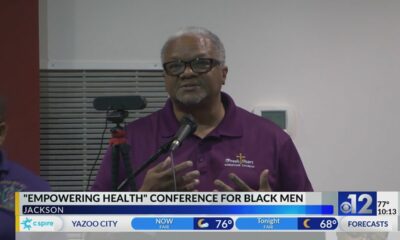Mississippi Today
‘Depriving people of their liberty.’ Lawmakers question jail without criminal charges
Restricting the use of jail to detain people who haven't been charged with a crime – a practice that is extremely rare in the vast majority of the country but common in Mississippi – is a top priority of the Department of Mental Health this session, director Wendy Bailey told lawmakers at a Senate Public Health Committee meeting on Wednesday.
Sen. Brice Wiggins, R-Pascagoula, said that having a mental illness is not a crime, and he suggested jailing people while they wait for treatment is against the law (though Mississippi commitment statutes permits it when there is “no reasonable alternative”).
“Do the counties not understand that's what this is and arguably could be opening the state up to litigation even further?” he asked Bailey, adding that the practice is “depriving people of their liberty.”
Bailey said she agreed.
“If you are sick and need a court commitment, that is not a reason to place an individual in jail,” she said.
Yet it happens hundreds of times a year at least. Mississippi Today and ProPublica found last year that people may spend days or weeks locked in a cell with minimal medical care as they wait for evaluations, a hearing, and then treatment through the civil commitment process.
So far, Rep. Kevin Felsher, R-Biloxi, has introduced a bill that would restrict jail detentions to situations when a person is waiting for transportation to a medical facility and permit such detentions for up to 72 hours only. House Public Health Chairman Sam Creekmore, R-New Albany, is planning to introduce a bill that would require individuals to receive a pre-evaluation screening by a mental health professional before they can be detained through the commitment process.
Bailey has said she supports those efforts, and she formally made that request to lawmakers at the Senate Public Health Committee hearing on Wednesday.
“We want an individual to see a mental health professional before a writ is issued,” she said.
Local officials including chancery clerks and a county supervisor also spoke to lawmakers, and others, such as Hattiesburg Mayor Toby Barker, sat in the audience.
Forrest County Chancery Clerk Lance Reid told the committee he had previously required each person who wanted to initiate commitment to contact the local community mental health center, Pine Belt, so that a mental health professional could determine whether commitment was necessary before the process began. But the agency instructed him to stop because that isn't allowed under current law.
“I would love for DMH to take another look at that situation,” he said, adding that the process kept some people out of the commitment process altogether.
Bailey described data showing that people are spending less time waiting in jail for a state hospital bed, with a current average of just under three days. But that figure only includes the amount of time people spend waiting after they have a hearing, which could happen 10 days or longer after they are first detained in jail.
The state has no data on how often people are jailed before a commitment hearing, nor how long they wait in jail before a hearing. Bailey told lawmakers the agency is still working on collecting information about people jailed before a hearing, which was a requirement of a law passed last year.
Lawmakers also raised questions about what Sen. Joey Fillingane, R-Sumrall, called “spiteful situations” in which someone files commitment paperwork against someone else not because of a genuine mental health issue but rather to hurt them by causing their arrest and detention in jail or a medical facility, sometimes during a divorce or custody dispute.
“It's not something you can just go take someone off the streets and put them in jail,” said Lamar County Chancery Clerk Jamie Aultman. “It's a step by step process.”
But the safeguards designed to keep people who don't need treatment out of the process are not always effective. In 2019, a DeSoto County woman was committed and forced to spend 18 days in a behavioral health facility after her husband filed an affidavit against her – even though the doctors who examined her before her hearing found “no evidence of mania or psychosis. She is no danger to herself or others. She is not in need of mental treatment.”
Aultman also described his work to establish a crisis stabilization unit to serve Lamar and Forrest counties. The project has secured state and federal funding as well as $1 million from each of the counties and $750,000 from the city of Hattiesburg. Currently, he said, Lamar County residents go to jail if a crisis bed is not available or won't admit the person.
The Lamar County Sheriff's Department shared data with Mississippi Today last year showing that from 2019 through 2022, more than 250 people were jailed during the commitment process, the vast majority with no criminal charges.
This article first appeared on Mississippi Today and is republished here under a Creative Commons license.
Mississippi Today
On this day in 1961
MAY 20, 1961

A white mob of more than 300, including Klansmen, attacked Freedom Riders at the Greyhound Bus Station in Montgomery, Alabama. Future Congressman John Lewis was among them.
“An angry mob came out of nowhere, hundreds of people, with bricks and balls, chains,” Lewis recalled.
After beating on the riders, the mob turned on reporters and then Justice Department official John Seigenthaler, who was beaten unconscious and left in the street after helping two riders.
“Then they turned on my colleagues and started beating us and beat us so severely, we were left bloodied and unconscious in the streets of Montgomery,” Lewis recalled.
As the mob headed his way, Freedom Rider James Zwerg said he asked for God to be with him, and “I felt absolutely surrounded by love. I knew that whether I lived or died, I was going to be OK.”
The mob beat him so badly that his suit was soaked in blood.
“There was nothing particularly heroic in what I did,” he said. “If you want to talk about heroism, consider the Black man who probably saved my life. This man in coveralls, just off of work, happened to walk by as my beating was going on and said ‘Stop beating that kid. If you want to beat someone, beat me.' And they did. He was still unconscious when I left the hospital.”
To quell the violence, Attorney General Robert Kennedy sent in 450 federal marshals.
This article first appeared on Mississippi Today and is republished here under a Creative Commons license.
Mississippi Today
2024 Mississippi legislative session not good for private school voucher supporters
Despite a recent Mississippi Supreme Court ruling allowing $10 million in public money to be spent on private schools, 2024 has not been a good year for those supporting school vouchers.
School-choice supporters were hopeful during the 2024 legislative session, with new House Speaker Jason White at times indicating support for vouchers.
But the Legislature, which recently completed its session, did not pass any new voucher bills. In fact, it placed tighter restrictions on some of the limited laws the state has in place allowing public money to be spent on private schools.
Notably, the Legislature passed a bill that provides significantly more oversight of a program that provides a limited number of scholarships or vouchers for special-needs children to attend private schools.
Going forward, thanks to the new law, to receive the vouchers a parent must certify that their child will be attending a private school that offers the special needs educational services that will help the child. And the school must report information on the academic progress of the child receiving the funds.
Also, efforts to expand another state program that provides tax credits for the benefit of private schools was defeated. Legislation that would have expanded the tax credits offered by the Children's Promise Act from $8 million a year to $24 million to benefit private schools was defeated. Private schools are supposed to educate low income students and students with special needs to receive the benefit of the tax credits. The legislation expanding the Children's Promise Act was defeated after it was reported that no state agency knew how many students who fit into the categories of poverty and other specific needs were being educated in the schools receiving funds through the tax credits.
Interestingly, the Legislature did not expand the Children's Promise Act but also did not place more oversight on the private schools receiving the tax credit funds.
The bright spot for those supporting vouchers was the early May state Supreme Court ruling. But, in reality, the Supreme Court ruling was not as good for supporters of vouchers as it might appear on the surface.
The Supreme Court did not say in the ruling whether school vouchers are constitutional. Instead, the state's highest court ruled that the group that brought the lawsuit – Parents for Public Schools – did not have standing to pursue the legal action.
The Supreme Court justices did not give any indication that they were ready to say they were going to ignore the Mississippi Constitution's plain language that prohibits public funds from being provided “to any school that at the time of receiving such appropriation is not conducted as a free school.”
In addition to finding Parents for Public Schools did not have standing to bring the lawsuit, the court said another key reason for its ruling was the fact that the funds the private schools were receiving were federal, not state funds. The public funds at the center of the lawsuit were federal COVID-19 relief dollars.
Right or wrong, The court appeared to make a distinction between federal money and state general funds. And in reality, the circumstances are unique in that seldom does the state receive federal money with so few strings attached that it can be awarded to private schools.
The majority opinion written by Northern District Supreme Justice Robert Chamberlin and joined by six justices states, “These specific federal funds were never earmarked by either the federal government or the state for educational purposes, have not been commingled with state education funds, are not for educational purposes and therefore cannot be said to have harmed PPS (Parents for Public Schools) by taking finite government educational funding away from public schools.”
And Southern District Supreme Court Justice Dawn Beam, who joined the majority opinion, wrote separately “ to reiterate that we are not ruling on state funds but American Rescue Plan Act (ARPA) funds … The ARPA funds were given to the state to be used in four possible ways, three of which were directly related to the COVID -19 health emergency and one of which was to make necessary investments in water, sewer or broadband infrastructure.”
Granted, many public school advocates lamented the decision, pointing out that federal funds are indeed public or taxpayer money and those federal funds could have been used to help struggling public schools.
Two justices – James Kitchens and Leslie King, both of the Central District, agreed with that argument.
But, importantly, a decidedly conservative-leaning Mississippi Supreme Court stopped far short – at least for the time being – of circumventing state constitutional language that plainly states that public funds are not to go to private schools.
And a decidedly conservative Mississippi Legislature chose not to expand voucher programs during the 2024 session.
This article first appeared on Mississippi Today and is republished here under a Creative Commons license.
Mississippi Today
On this day in 1925


MAY 19, 1925

Malcolm X was born Malcolm Little in Omaha, Nebraska. When he was 14, a teacher asked him what he wanted to be when he grew up and he answered that he wanted to be a lawyer. The teacher chided him, urging him to be realistic. “Why don't you plan on carpentry?”
In prison, he became a follower of Nation of Islam leader Elijah Muhammad. In his speeches, Malcolm X warned Black Americans against self-loathing: “Who taught you to hate the texture of your hair? Who taught you to hate the color of your skin? Who taught you to hate the shape of your nose and the shape of your lips? Who taught you to hate yourself from the top of your head to the soles of your feet? Who taught you to hate your own kind?”
Prior to a 1964 pilgrimage to Mecca, he split with Elijah Muhammad. As a result of that trip, Malcolm X began to accept followers of all races. In 1965, he was assassinated. Denzel Washington was nominated for an Oscar for his portrayal of the civil rights leader in Spike Lee's 1992 award-winning film.
This article first appeared on Mississippi Today and is republished here under a Creative Commons license.
Did you miss our previous article…
https://www.biloxinewsevents.com/?p=359877
-
Our Mississippi Home7 days ago
Beat the Heat with Mississippi’s Best Waterparks
-
SuperTalk FM4 days ago
State auditor cracking down on Mississippians receiving unemployment benefits
-
Mississippi News Video6 days ago
Jackson has a gang problem
-
Kaiser Health News7 days ago
Medicaid ‘Unwinding’ Decried as Biased Against Disabled People
-
Local News3 days ago
Family files lawsuit after teen’s suicide in Harrison County Jail
-
Mississippi Today5 days ago
On this day in 1950
-
228Sports6 days ago
George County Pours Runs In 6A South State Title Victory At PRC
-
Local News Video5 days ago
In the Kitchen with J's Restaurant








































